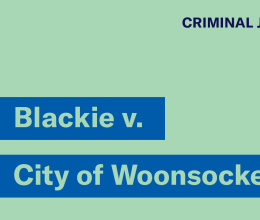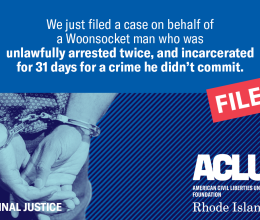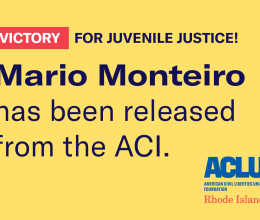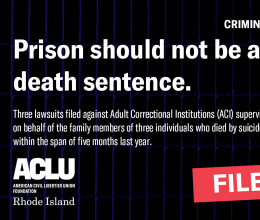Relying on recently-released statistics showing that Providence Police Department’s compliance with the Traffic Stops Statistics Act in May, 2003 was the lowest than at any time since the City was held in contempt of court last October for violating that Act, the ACLU has called on the City to continue to collect traffic stops data on a voluntary basis for the indefinite future. Only in this way, the ACLU said in a three-page letter to Mayor David Cicilline, can the City seek to stem the problem of racial profiling in the City, which a top police official has acknowledged is occurring. Pursuant to a court order issued last year in response to the ACLU’s lawsuit challenging the City’s non-compliance with the Act, traffic stops data collection continued through July, but has since ceased.
The ACLU’s call for continued data collection was prompted by Northeastern University’s release of data from May of this year which demonstrated, according to the ACLU, “an inexplicable, but significant and incontestable, decline in compliance” with the law. Northeastern has been examining the Police Department’s compliance – in terms of completeness and accuracy of cards submitted – through six different measurements. The ACLU’s letter states that May’s measurements were the worse they have been when compared to figures from the last five reports -- three done before January, and two since Mayor Cicilline took office.
The letter focused on one measurement designed to reveal the general accuracy rate for traffic stop cards, where Northeastern tries to match cards with videotaped stops made by police cruisers. For May, matches were made only 77% of the time, a rate worse than every month but one since October. “In other words,” said the letter, “the cards for one out of four videotaped stops in May contained enough misinformation that Northeastern could not match the stop with a filled-out card. If such inaccuracies are still taking place with videotaped stops, one can only imagine the inaccuracy rate for cards being filled out for non-taped stops.”
The letter noted, “At least five months into your administration, police in too many instances have been shown not to be collecting data properly. If the City cannot get its police officers to accurately and completely fill out traffic stop cards, we find it difficult to comprehend how you can eradicate the much more insidious, and often subtler, problem of racially biased actions in traffic stops by officers.” The ACLU said the data demand “implementation of at least one immediate plan of action: a Departmental directive voluntarily reinstating the traffic stops data collection process. . . In the absence of continued data collection, it will be virtually impossible for the City to target problem areas and to truly ensure that racial profiling is not still taking place.” The ACLU has not received a response to the letter, which was sent last week.








